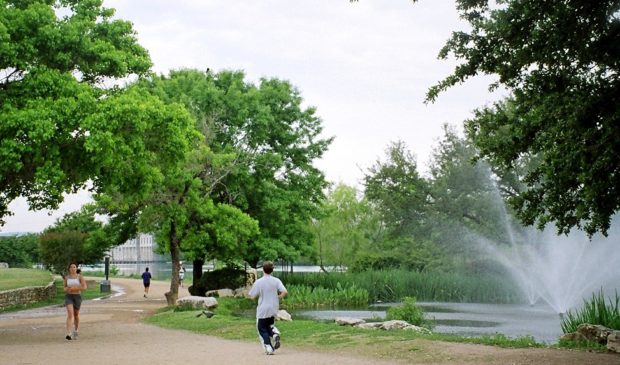Photo by Larry D. Moore
Parks board tables renaming recommendations for Council
Monday, December 14, 2020 by
Sean Saldaña The Parks and Recreation Board has once again taken up the task of suggesting revisions to the city’s naming and renaming ordinance, the law that lays out guidelines for the naming process behind city facilities like parks, sports complexes, pools, and other public gathering places.
According to the parks board, “The current process and timeline for naming or renaming of a park or park facility has caused confusion among applicants and community members interested in providing feedback on a proposed name or name change.”
Parks board members, who voiced no concerns about the operational suggestions around community engagement and a clarified application process, expressed some hesitance about the naming suggestions at their latest meeting.
“I have a concern if we’re not naming after individuals … except for the individuals who are wealthy enough to make those kind of contributions,” Board Member Laura Cottam Sajbel said. “It seems to me it sort of perpetuates systemic economic inequality of who gets a park named after them.”
The effort to propose formal recommendations to City Council was spearheaded by Board members Anna Di Carlo and Francoise Luca. At the special Parks and Recreation Board meeting on Dec. 4, they presented an initial draft of recommendations.
During their presentation, additional concerns were raised about the operations costs associated with renaming and the strains the renaming process puts on Parks and Recreation staff members.
Di Carlo said, “We’ve also learned that namings of parks can be a cost … burden to the parks department. … The costs associated with the naming or renaming are initially the responsibility of the applicant; however, City Council has waived those fees many times.”
She also noted that “naming or renaming can cost anywhere between $1,000 and $10,000.”
A summary of the recommendation draft included three points concerning operations: increased community engagement, clearer outlines for the application and approval process, and informing applicants looking to rename a facility about the cost – in order to protect the park’s budget.
The summary included two recommendations for how names should be selected. Di Carlo and Luca suggested Council remove the option for parks and park facilities to be named after individuals. Instead, they suggested that names should come from “geographical, historical or cultural surroundings.”
The noteworthy exception they outlined would be for donors who provide resources for “at least 75 percent of the development of the park facility.”
Luca justified the suggestion for revising name restrictions by appealing to pragmatism.
She said, “We were also very concerned about not discouraging gifts to the parks department, and if we do not recognize people who want to donate large tracts of land – any tracts of land at this point – then we’re doing a disservice to the parks system.” The goal, she said, is to “encourage donations of land.”
Board Member Rich DePalma agreed with other board members on “four of the five recommendations,” but felt that limiting namings to large donors would be inequitable.
Board Member Sarah Faust echoed those sentiments when she said, “When I read this and noted that you could name a park facility for an individual that deeds land to the city for a facility or contributes some large amount of the cost, and that’s the only person that can have a park or park facility named (for) them, that doesn’t quite read right to me.”
After more discussion, Luca and Di Carlo clarified that they were amenable to changes and were open to discussing the naming clauses further.
Luca closed by saying, “Maybe we do need to spend some more time (on the recommendation process). … I think that it would be good to expand the committee to make sure that we have all kinds of input.”
From there, both Luca and Di Carlo agreed to withdraw the motion for the time being to continue discussing the recommendations further.
Photo [CC BY-SA 3.0 or GFDL], via Wikimedia Commons.
The Austin Monitor’s work is made possible by donations from the community. Though our reporting covers donors from time to time, we are careful to keep business and editorial efforts separate while maintaining transparency. A complete list of donors is available here, and our code of ethics is explained here.
You're a community leader
And we’re honored you look to us for serious, in-depth news. You know a strong community needs local and dedicated watchdog reporting. We’re here for you and that won’t change. Now will you take the powerful next step and support our nonprofit news organization?



